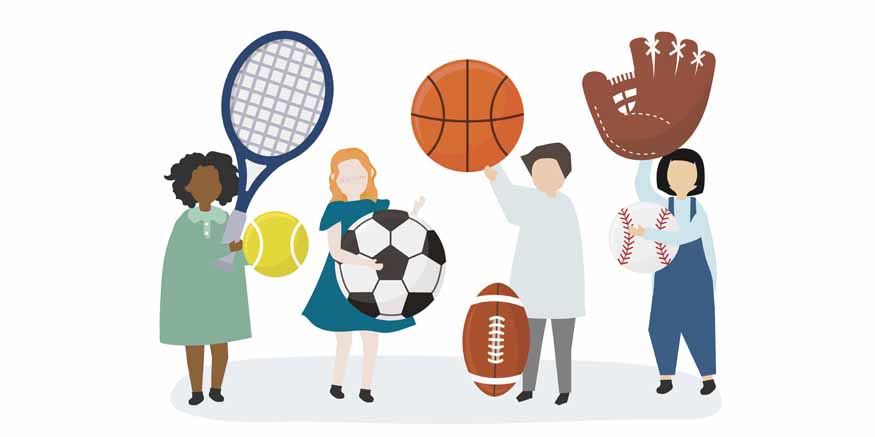Sports play an important role in your child’s holistic development. Its benefits in both physical and mental growth cannot be overstated. Sports play a pivotal role in shaping well-rounded individuals and teach several vital life skills to them.
Engaging in sports activities is not only about physical fitness but also about inculcating essential life skills such as teamwork, leadership, discipline, and perseverance. The role of sports in our lives extends beyond the playground, influencing academic performance and social interactions, thus contributing to the overall development of students.
The significance of sports lies in their ability to provide a structured environment where students can channel their energy positively. Regular participation in sports activities helps students build resilience, improve concentration, and develop a sense of responsibility. The importance of games in students’ lives is evident in the way they learn to handle both victories and defeats gracefully.
Physical Benefits of Sports
The physical benefits of sports for students are well-documented and widely recognised. Engaging in sports activities promotes physical fitness, helping students maintain a healthy weight, improve cardiovascular health, and flexibility. Regular physical activity also boosts the immune system, reducing the risk of chronic illnesses such as obesity, diabetes, and heart disease. Furthermore, students who participate in sports are more likely to adopt a healthy lifestyle, including proper nutrition and adequate rest, which are essential for their overall well-being.

Sports activities contribute to the development of motor skills and coordination. From running and jumping to throwing and catching, sports require a wide range of physical movements that enhance students’ agility, balance, and hand-eye coordination. These skills are vital for sports performance and daily activities, ensuring that students grow up to be physically capable and confident individuals.
Mental and Emotional Benefits of Sports
The importance of sports in students’ lives extends to mental and emotional well-being. Participation in sports has been shown to reduce stress, anxiety, and depression by releasing endorphins. Sports also provide a constructive outlet for students to express their emotions, helping them manage stress and build emotional resilience. Furthermore, the discipline and focus required in sports activities improve students’ concentration and cognitive abilities, leading to enhanced academic performance.

Sports also play a crucial role in developing students’ self-esteem and confidence. Achieving personal goals, whether it is mastering a new skill or winning a game, instills a sense of accomplishment and pride. The social interactions inherent in sports activities foster a sense of belonging and camaraderie, helping students build strong interpersonal relationships. The role of sports in our lives is thus multifaceted, contributing to the holistic development of students.
Social Benefits of Sports
The significance of sports is particularly evident in the social development of students. Sports activities provide an excellent platform for students to learn and practice essential social skills such as communication, cooperation, and leadership. Working together towards a common goal in team sports teaches students the value of teamwork and collaboration. They learn to communicate effectively, resolve conflicts amicably, and support their teammates, all of which are crucial skills for their future personal and professional lives.
Moreover, sports activities promote cultural diversity and inclusivity. Students from different backgrounds come together to participate in sports, fostering mutual respect and understanding. This exposure to diverse perspectives enriches students’ social experiences and helps them develop empathy and tolerance. The importance of games in students’ lives is thus not limited to physical activity but also encompasses the development of a positive and inclusive social environment.
Academic Benefits of Sports
The benefits of sports for students extend to their academic performance as well. Research has shown that students who participate in sports are more likely to excel academically. The discipline, time management, and focus required in sports activities translate into better study habits and academic achievement. Additionally, the physical activity involved in sports improves cognitive function, enhancing memory, attention, and problem-solving skills.
Participation in sports also teaches students valuable life lessons that can be applied to their academic pursuits. For example, the perseverance and resilience developed through sports activities help students overcome academic challenges and setbacks. Furthermore, the goal-setting and strategic thinking involved in sports can be applied to academic tasks, helping students approach their studies with a proactive and determined mindset.
The importance of sports in students’ lives is multifaceted, encompassing physical, mental, emotional, and social benefits. Sports play a crucial role in shaping well-rounded individuals by promoting physical fitness, enhancing cognitive abilities, and fostering essential life skills. The role of sports in our lives is not confined to the playground; it influences various aspects of students’ development, contributing to their overall well-being and success.
At Mother’s Pet Kindergarten, we recognise the significance of sports and strive to create an environment where students can thrive through active participation in sports activities. Our dedicated educators and coaches provide opportunities for students to explore their interests, develop their skills, and experience the joy and benefits of sports. By emphasising the importance of games in students’ lives, we aim to nurture confident, resilient, and socially responsible individuals who are equipped to face the challenges of the future.













Recent Comments